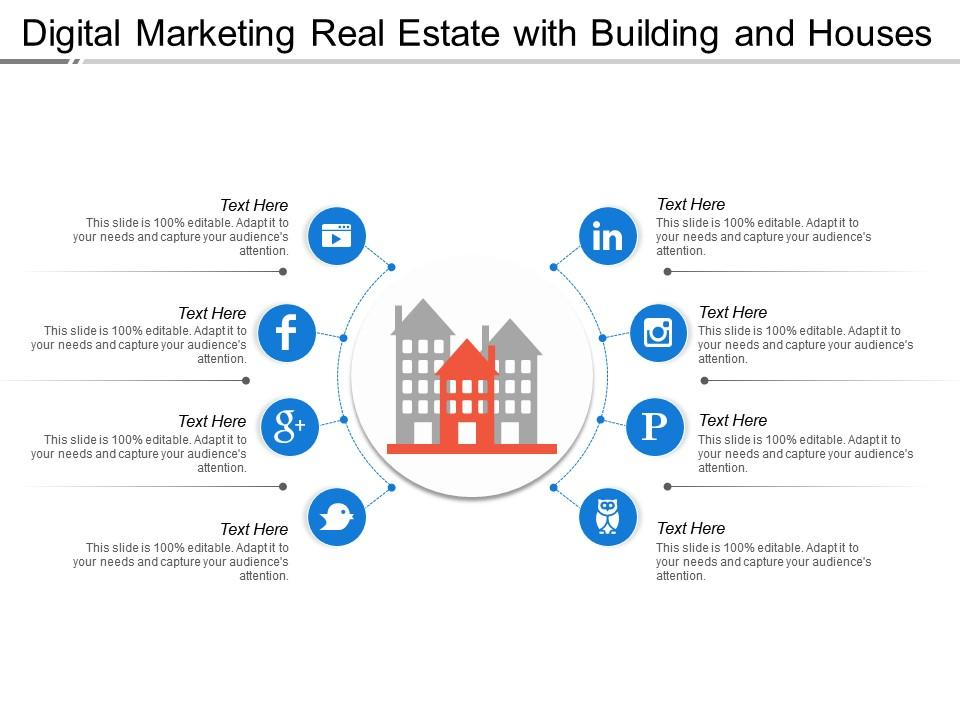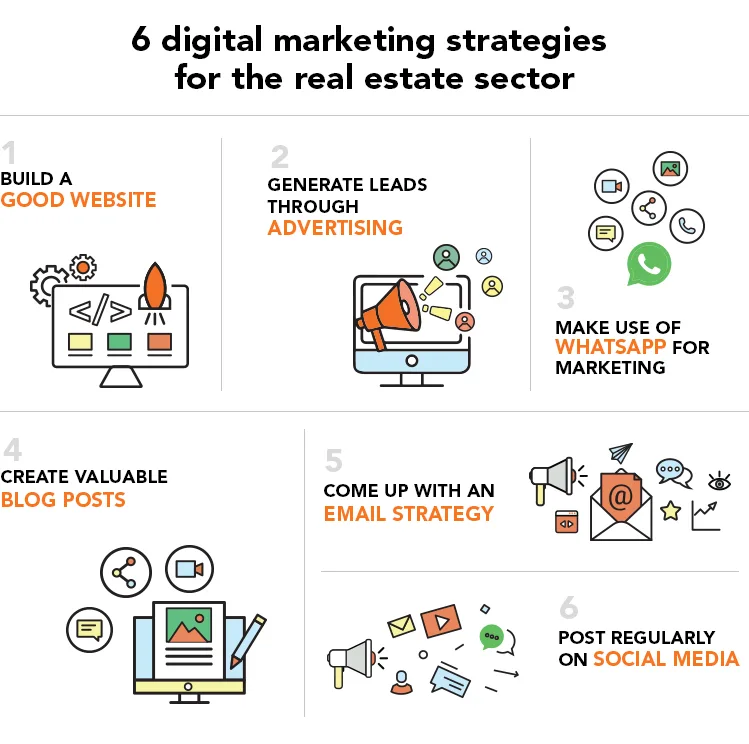
Table of Contents
- Importance of Blogging and Digital Marketing in the Real Estate Industry
- 10 Ways Real Estate Companies are Using their Blogs
- Key Takeaways
- Conclusion
- FAQs
In some manner, shape, or form, 77 percent of realtors utilize social media for real estate. Other sources find that social media generates the most excellent quality leads, according to 47 percent of real estate companies.
Buying or selling real estate is an enormous financial (and emotional) investment. When it comes to this undertaking, most individuals have many questions. Your clients are searching for more than just a real estate agent. They want a depiction of who will keep their best interests in mind and counsel them through the real-estate ownership complexes. They must choose an agent with whom they will feel comfortable working throughout the procedure.
When we want to know something, we look for it online. This is where social media enters the picture. If done right, real estate blogs may be a fantastic chance to start a conversation, provide advice, and build a long-term connection with buyers, sellers, and renters. Learn about the advantages of utilizing social media for real estate, a helpful list of do’s and don’ts for agents, and examples of posts you can use in your real estate social media strategy in this post.

Importance of Blogging and Digital Marketing in the Real Estate Industry
Online and digital marketing has transformed the art of “shopping.” Everything is offered on the Internet, from everyday necessities to high-tech technological products. The new slogan is hassle-free and time-saving, and real estate is no exception.
Those days are long gone when the buyer had to sift through hundreds of listings to find your ideal property. The process of buying a property has changed dramatically in recent years because of digital marketing and cutting-edge technologies. Although many people believe that word-of-mouth advertising is the most effective way to sell anything, research shows that this is not the case. In only one year, online real estate transactions reached an all-time high of 85%.
Digital marketing improves the purchasing experience of homebuyers in real estate.
- The purchasers are starting to embrace the challenges of property searching.
- Safe, fast, and with more freedom to select their ideal property from millions of listings.
- Virtual tours of the complete house allow the buyer to get a sense of the place and decide.
- Mobile application development allows a buyer to not only search for and settle on a property but also to rent or even buy a home while on the go.

10 Ways Real Estate Companies are Using their Blogs
1. Create an email marketing campaign
It’s no doubt that email marketing is beneficial to inbound marketing, too; it helps one connect with new leads and keep in touch with old ones. A comprehensive campaign will guide potential customers based on their buyer profile and past encounters with you.
According to Smart Insights, the typical open rate of emails for real estate enterprises is about 27%, with a click-through rate (CTR) of 3%. However, the more relevant your content is to a customer, the more likely they are to open your mail and check out what you have to say. You could embed your real estate blog link in the email and direct your subscribers to the newest blog update.
2. Pay-per-click advertising
Pay-per-click, sometimes known as PPC, is a technique of online marketing in which advertisers make a payment every time one of their adverts is clicked on. Simply put, you only pay for the promotion if a potential client clicks on your advert. It’s a way of ‘buying’ internet views in addition to attracting organic traffic to your site.
PPC starts with setting the correct goals and KPIs, creating a campaign structure, a set of regular optimization actions, and measuring progress through systematic reporting and benchmarking.
3. Formulate a social media marketing plan
- Real estate on Facebook: Create a Facebook business page to get started. This is more professional than publishing to a personal account, and it offers you access to business-related methods like page statistics and the opportunity to promote postings to your audience. On Facebook, posts with photos and video perform best, so make sure to include eye-catching graphics in every post you make. You can repurpose your real estate blogs into visually appealing videos.
- Instagram for the real estate industry: Instagram is swiftly rising in popularity as one of the most popular social networking platforms. Every real estate post will need to be aesthetically appealing because this is a visual platform. Include your contact information and extra data in the caption with the photo. A single Instagram post may contain a sequence of photographs, making it an ideal platform for displaying images of a new real estate listing. Again, you can repurpose the content from a long real estate blog into carousel posts.
- Real estate for LinkedIn: Make alterations to your profile, and if you have a business, build a profile for it as well. LinkedIn is a fantastic place to network with other real estate agents, connect with brokerages, and connect with current clients.
4. Organize a webinar
All areas of real estate companies, such as purchasing, selling, and mortgage financing, require some level of trust and dependability to acquire potential consumers’ faith. Those looking to purchase or sell a house should always make sure that their realtor is familiar with the rules, regulations, and can help them in the process properly. Real estate blogs also allow you to flex your expertise on the subject matter.
Another significant benefit of webinars in the real estate market is producing presentations that can be used to explain the numerous complex housing operations to a real estate target audience. Buyers, sellers, and borrowers will all be included.
5. Make sure you devote time to SEO.
You’ll need SEO specialists who specialize in real estate website optimization since, despite your company’s prosperity, there are a lot of other things you’ll need aid with. For example, you’ll require real estate SEO specialists for guidance on handling discriminatory housing legislation and ensuring that your digital advertising complies with NAR advertising policies.
A competent real estate SEO team (and real estate content marketing plan) is particularly vital since it helps you build stronger relationships with new and potential house purchasers. On top of that, you’ll need the most excellent real estate marketing plan to help your firm or agency stand out in the market.
6. Don’t forget about your current customers
Realtors may use social media to create relationships and find new customers. But that’s only one aspect of its allure. It can also help in the maintenance of existing connections. When the closing documents are signed, what happens next? Clients get an adrenaline high, but after a few months, normalcy returns. One year after closing, 70% of homeowners cannot recall the name of their real estate agent. It’s a pity to lose those relationships after putting so much effort into creating them. It’s much easier to keep them up to date with a bit of social media love. As a result, when customers are ready to relocate again or refer a realtor to relatives or friends, you’ll be the first person they call.
What is the best way to accomplish this on social media? Publish a consistent supply of the evergreen material we discussed previously. Make a list of everything you wish you’d known before buying a house. Is it a piece of design inspiration? Are there any checklists to help you get organized? Is there anything you can do to prepare for the winter or save money on your electricity bills? Try to include everything that you may want to know about real estate in your real estate blogs. You may also expand your content outside real estate. Your customer now lives, works, and integrates into the community after relocating. That new eatery down the street could pique their curiosity—alternatively, the top summer camps to send their children to. You can establish yourself as their go-to person for all things local.

7. Respond to both positive and negative feedback
Both negative and positive feedback helps you grow. Negative feedback helps you fix the chinks in your system, and positive feedback enables you to realize that it has worked. Look through the comments section in your real estate blog posts, or try to use forms to get customer feedback.
8. Create a user-friendly website
All demographics – baby boomers, millennials, or Gen-Z – may stumble on your website. In such a case, you must have a user interface prepared to handle this sort of adversity. And hence, create a website that is accessible!
9. Create and post valuable blog content
You must know who you’re writing for to maintain material valuable and intriguing. Consider the following questions to learn more. Are most of your clients’ sellers, purchasers, or a combination of the two? Do you want to use your real estate blog to keep in touch with prior clients so you’ll be the primary individual they think of when they need to relocate? Do you have a specific service area?
It’s fine to cater to many audiences, but make sure you give equal quantities of relevant content to each and categorize your articles (for example, “Home Buying,” “Home Selling,” and “Homeownership”) so that customers can quickly discover what they’re searching for.
10. Virtual host tours
Virtual house tours are more helpful than webinars. They give the buyer a feel of the house before they step into it. When you combine quality real estate blogs with video content, you create opportunities to attract premium clients.
Key Takeaways
- Blogging is a key tool to establish oneself as a real estate expert and generate high-quality leads. Your real estate business provides plenty of blogging material.
- Blogging is an inexpensive way to reach thousands of potential clients.
- A user-friendly website would draw in more organic traffic.
- When you post valuable content in your real estate blogs, clients see you as an expert in this domain. They would be far more willing to engage with you.
- Optimize social media platforms like Facebook, Instagram, and Linkedin to post your real estate blog examples.
- Ensure that your real estate blogs are SEO-optimized for maximum reach and ranking on search engines.
- Your email marketing campaigns should not only focus on customer acquisition but also customer retention and customer engagement.
- You must always respond to both positive and negative feedback.

Conclusion
Now it’s your turn! Every realtor’s marketing toolset now includes a social media component. Thankfully, it doesn’t have to be as complicated as it formerly was. When you use the recommendations above to establish your real estate marketing plan, you’ll be able to create better real estate blogs, attract a larger audience, engage with them, and generate more leads.
FAQs
Blogging is a method for establishing oneself as a real estate expert and generating high-quality leads. Your real estate business provides plenty of blogging material. Real estate blogs offer the perfect opportunity to provide free information to your audience and gain their trust.
The first step is to choose a host. If you put out a quick Google search for “blog posts,” you’ll get a plethora of results. The next step is to create content for your real estate blogs. Try to look for other real estate blog examples online, look for trending keywords, and search for high-quality images. Try to maintain a consent calendar to schedule your content. Maintain consistency and punctuality. Soon, the word about your content would spread and you may find your real estate blog trending worldwide.
It is suggested that you publish three times a day, up to twenty times a day. It’s preferable to publish three times a week on workdays, for a total of 20 posts every month. Make sure that you do not spam your users on every channel.
It’s best to publish 1-2 times each day and no more than 3-5 times per day. Bonus: Use our free, editable social media calendar template to plan and schedule all of your content ahead of time. Now is the time to get the template!
1. Promote the town as a whole, rather than simply the house.
2. Be true to yourself. Make sure that your brand and blogs reflect your persona.
3. Educate your potential customers.
4. Interact with your customers.
5. Respond to both positive and negative feedback.
6. Avoid merely announcing your real estate listings.
7. Post visually appealing content.
8. Never make the mistake of addressing your real estate blogs 9. only to first-time purchasers
Latest Blogs
Explore how Google’s 2025 AI search updates triggered ranking chaos. Learn actionable strategies to adapt your SEO for AI Overviews, zero-click searches, and SERP volatility. Stay ahead now.
Learn how to rank on AI search engines like ChatGPT, Perplexity, and Gemini by optimizing your content for authority, structure, and relevance. Stay ahead in AI-driven search with this strategic guide.
Explore the best healthcare SEO services for your medical practice. Improve online visibility and effectively reach more patients in need of your services.
Get your hands on the latest news!
Similar Posts

Content Analytics
8 mins read
Google I/O 2025: AI Search Shake-Up & Ranking Volatility

Artificial Intelligence
5 mins read
Top AI Blog Writing Tools for Website Monetization

Blogging
10 mins read